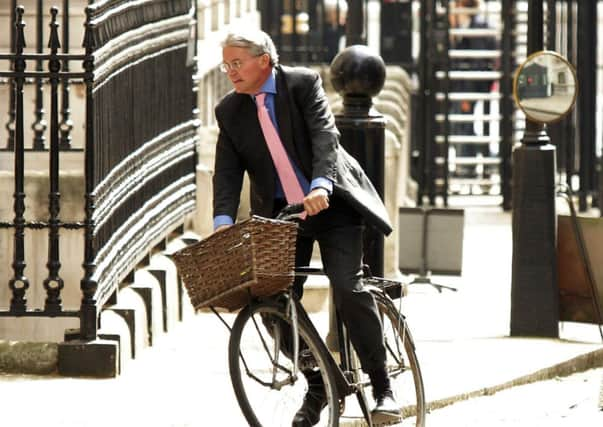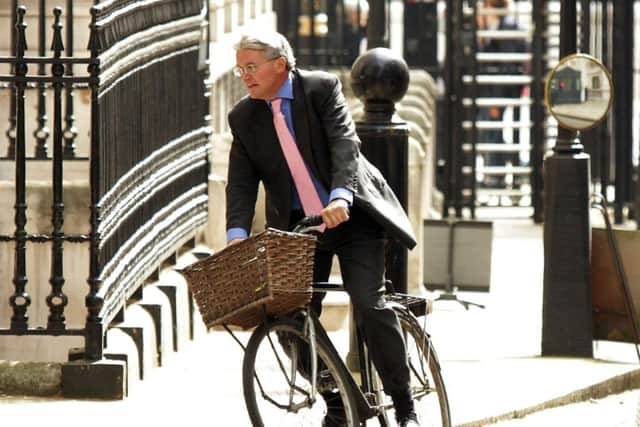Police should wear cameras and microphones says Yorkshire MP


David Davis, the Conservative MP for Haltemprice and Howden and a former Shadow Home Secretary, said the Independent Police Complaints Commission (IPCC) should be beefed up to become a British “Untouchables”, able to carry out investigations without obstruction.
Mr Davis, a close ally of former chief whip Andrew Mitchell – who resigned in the wake of a row with police at the gates of Downing Street – also called for officers to be forced to wear cameras and microphones when on duty to record their actions as part of an effort to address a “decline in public trust”.
Advertisement
Hide AdAdvertisement
Hide Ad“What we need is a tougher regulator,” Mr Davis said. “The Government should respond by giving the IPCC the powers and resources to outrank and overrule every chief of police in the land – to become a British ‘Untouchables’. Never again should a police force be able to delay or frustrate an IPCC investigation.”


But Mr Davis said identifying problems after the event was not enough, and the wider “crisis of ethics” needed to be addressed by a Royal Commission. He claimed the Mitchell case was the “latest in a long list of police investigations set up to seek the truth but conducted as clumsy cover-ups”.
He highlighted the recent revelations about the Hillsborough disaster in South Yorkshire, in which police errors contributed to the deaths of 96 football fans in April 1989. Police later tried to cover-up their mistakes and pin the blame on those who died.
“Britain needs root-and-branch reform of policing culture, a feat beyond the powers of even a powerful independent regulator,” Mr Davis said. “The Government should appoint a Royal Commission to investigate the conduct of the police.”
Advertisement
Hide AdAdvertisement
Hide AdFormer Prime Minister Sir John Major apologised on Tuesday for his Government’s failure to act over Hillsborough in the 1990s, suggesting he was too quick to believe accounts of senior officers.
“We had pretty strong police views that there was no need for a report at the time,” he said. “Nowadays I’m not sure that assurance would ring as strongly as it did in the 1990s.”
Responding to Mr Davis yesterday, Metropolitan Police Commissioner Sir Bernard Hogan-Howe said he was “open-minded” about the establishment of a Royal Commission into police standards.
“If it’s about the Plebgate issue, and also if you think about Hillsborough, you’ll need a cool, clear reflection at the end of this issue to see whether or not that’s needed,” he said.
Advertisement
Hide AdAdvertisement
Hide AdMr Davis’ intervention came as three officers accused of trying to discredit Mr Mitchell appeared before MPs in Parliament and remained defiant despite their chief constables issuing public apologies and the renewed threat of disciplinary action.
Police Federation representatives Inspector Ken MacKaill, Detective Sergeant Stuart Hinton and Sergeant Chris Jones would apologise only for their haste in speaking to the media straight after the meeting in October last year when they told journalists Mr Mitchell had refused to tell them exactly what he said during a foul-mouthed confrontation with officers in Downing Street the previous month.
The three were later accused of giving a misleading account of the 45-minute meeting, which was recorded by the politician.
Mr Hinton told the Home Affairs Select Committee they accepted they had shown “poor judgment” but added: “We certainly didn’t lie intentionally.” Mr Jones said he did not believe they had done any-thing wrong, while Mr MacKaill stood by their initial account.
Advertisement
Hide AdAdvertisement
Hide AdChief Inspector Jerry Reakes-Williams, who conducted the internal investigation, told MPs he still believes the officers have a case to answer for “misconduct”.
Committee chairman Keith Vaz told the three officers that giving inaccurate evidence would amount to a contempt of Parliament, adding: “We have found your evidence most unsatisfactory.”
Comment: Page 12.